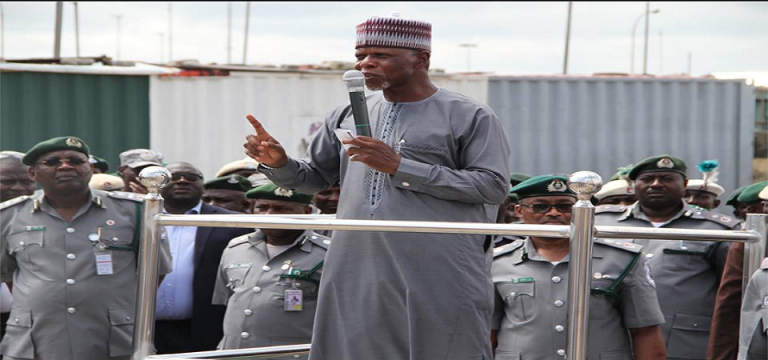
In October 2018, the European Union (EU) handed cargo scanners to Nigeria and Togo, just after the completion of the newly built Seme-Krake joint border.
Keti karlsen, the head of the EU delegation to Ecowas handed the machine to President Muhammadu Buhari and his Benin Republic counterpart, Patrice Talon, to facilitate easy and faster clearance of goods along the Seme-krake border.
The Seme Krake Joint Border Post (JBP) was facilitated by ECOWAS’ Road Transport and Transit Facilitation Programme, aimed at fostering regional trade through road infrastructure. The JBP defied the old norms to represent modern structures that will accommodate the current demographics of West African states. With its international standard, there is room for huge inflow of goods and services and intra-trade activities in the region.
Register for Tekedia Mini-MBA edition 18 (Sep 15 – Dec 6, 2025) today for early bird discounts. Do annual for access to Blucera.com.
Tekedia AI in Business Masterclass opens registrations.
Join Tekedia Capital Syndicate and co-invest in great global startups.
Register for Tekedia AI Lab: From Technical Design to Deployment.
But to many people’s worry, especially shippers, the Nigeria Custom Service (NCS) is yet to put the scanners to use. It’s been over a year now, and there is no plan to install the equipment.
Recently, the Nigerian Shippers Council (NSC) organized a stakeholders meeting over the border closure and the way forward. During the meeting, Bello Jibo, Head, Revenue for Seme Customs, acknowledged that the NCS has in its possession, two functional scanners at Seme Border.
“One scanner was provided by the Economic committee of West African States (ECOWAS) to us but we have not started using it. We are making use of the old scanner that we have. Though just recently, the old scanner had a downtime, but we are currently working on it,” he said.
Stakeholders’ concern about the functionality of the scanner stems from the recent events in the border, mainly the closure that has subjected goods and services to more scrutiny. Jibo did not give a reason why the scanner is not in use and that stirs curiosity.
Attention has been shifted to the seaports recently due to the closure of land borders. Hassan Bello, Executive Secretary of the NSC noted that there is an expectation of increase in activities at the seaport, a reason the Customs Service should be up and doing in the use of equipment to fast-track import and export activities through the seaport.
“We are having longer waiting days in the anchorage, and we need to put other ports into use. Customs needs to ensure that equipment like scanners are put into use as well to fast trade through quicker cargo clearance,” he said.
Jibo acknowledged that the scanners, when functional, have been instrumental to speedy processes of clearance of goods in the border. He said when goods are scanned and nothing wrong is detected in accordance with trade guidelines, the cargo would be passed without physical examination.
The concern about unutilized equipment goes beyond the Seme Krake border. It has been noted also that the mobile scanning equipment valued at $120 million, handed to the NSC by Destination Inspection (DI) service providers, have been laying in waste since five years now. Just like in other places, the Custom Service has refused to make use of the scanning equipment to the detriment of rapid clearing services.
It is reported that over 90 percent of all goods passing through Nigerian seaports and borders go through physical examination, a process that has resulted in congestion and slow service delivery.
The Managing Director, Gold-link Investment Limited, Tony Anakebe, said the slow pace of clearing activities in Nigerian ports has put other ports in West Africa ahead of Nigeria.
“This is why the process of clearing imported cargo at the Nigerian ports is currently the longest compared to clearing from other seaports in neighboring West African ports,” he said.
The NCS’ refusal to put the scanning equipment to use has been seen as deliberate. The physical examination of goods in Nigerian seaports has been fingered as the bane of transparency and congestion in ports among other things. In the wake of the border closure, experts called on the Federal Government of Nigeria to use gadgets in its fights against smuggling. Obviously, the acknowledgement of the Custom Service that scanners are not being used in the borders is only a confirmation of what many people have been saying – winning the war against smuggling depends more on efficient customs service.
To contain the porousness of Nigerian borders, the Nigeria Customs Service must learn to make use of security gadgets in their service delivery.



